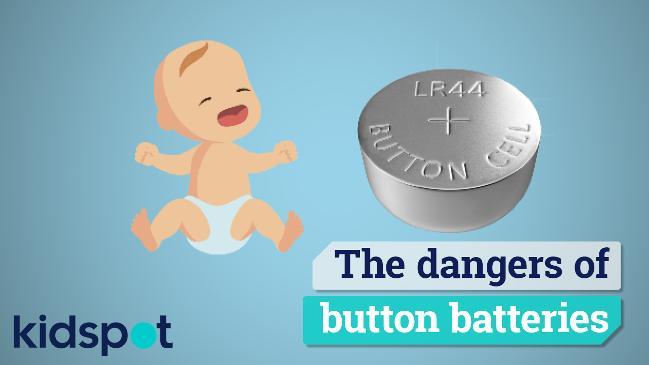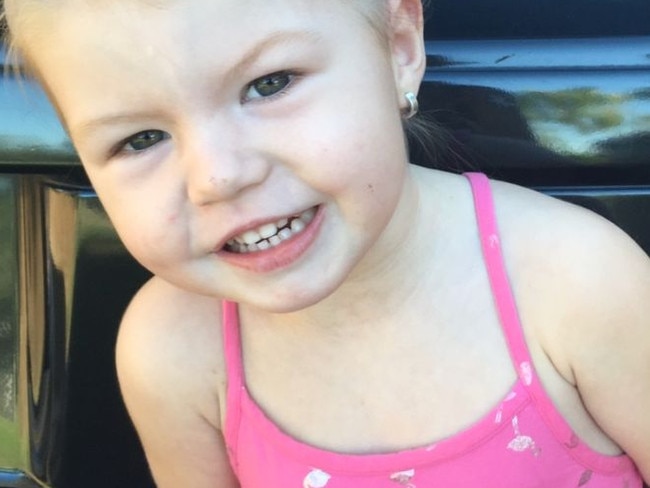Three-year-old girl dies after swallowing common household item
Lorraine and David Conway are fighting for stricter legislation, begging the government to regulate the item that killed their little girl.

Kids
Don't miss out on the headlines from Kids. Followed categories will be added to My News.
Devastated parents Lorraine and David Conway are calling for urgent regulation of button batteries, after their little girl Brittney died from swallowing one in July.
The three-year-old swallowed the battery, which then burned through her oesophagus and into her aorta.
Speaking publicly for the first time about the death of their youngest child, the Conways said little Brittney died on July 28 at the Queensland Children’s hospital, three weeks after swallowing the battery.
Doctors initially suggested her symptoms could have been due to food poisoning, before the battery was eventually discovered.
RELATED: Sydney toddler undergoes major surgery after swallowing button battery

Brittney’s initial symptoms included vomiting and a sore throat, Mrs Conway told ABC News.
A few days later, she complained of chest pain and began refusing food, appearing to be in agony whenever she tried to ingest solids. Brittney was taken to Robina Hospital on the Gold Coast, where the doctor guessed she had a virus.
Despite asking for an x-ray, “No x-ray was ever done”, according to Mrs Conway.
Nine days after first showing symptoms, hearing her daughter cough during the night, Mrs Conway got up to check on her.
“Brittney was lying in a pool of blood, unconscious,” she said.

After the three-year-old was rushed by ambulance to the Gold Coast University Hospital, she was finally X-rayed and the battery was found.
After suffering through nine hours of surgery to remove the battery, doctors were unable to stabilise her and Brittney was transferred to Queensland Children’s Hospital.
There, she underwent further surgery, but eight days later died from her injuries.
“She just had a beautiful nature … just a really content and happy little girl,” Mrs Conway said.
“She had a thousand sparkles in her eyes.”
Queensland Health has advised it is carrying out a review of Brittney‘s death and extends “sincere condolences” to her family and friends.
Brittney’s tragic death has reignited fierce debate around regulation of the common household items.
Kidsafe chief executive Susan Teerds said the regulation of button batteries was critical.
“For 40 years companies have been dumping these, what I call landmines, into our homes and they’ve known they’re problematic,” Ms Teerds told ABC News.
Please share with families: Lithium button batteries (like a 5 pence piece) can cause significant damage or death if swallowed by a child (even 'flat' batteries pose a threat). Keep batteries out of reach of young children. @CAPTcharity @RoSPA https://t.co/mSm4Pynp4m pic.twitter.com/HiaT1vQi5P
— National Child Mortality Database (NCMD) (@NCMD_England) October 5, 2020
WHAT TO DO IF YOUR CHILD SWALLOWS A BUTTON BATTERY
Every day in Australia there is at least one child who needs to be hospitalised because they have swallowed a button battery.
The most common age for this is between the ages of zero to four years old, with body regions affected including the bowel, oesophagus, nose and ear.
The small, shiny batteries are often used in common household items including TV or key remotes, scales and toys and once swallowed, they start to burn internally causing lifelong injuries or death.
If your child ingests a button battery you should call triple-0 immediately if they are having any trouble breathing.
If they are not having trouble breathing parents should:
– Call the Poisons Information Centre immediately on 13 11 26. You will be directed by staff to an emergency department that is best able to treat your child.
– Do not try to make your child vomit.
– Do not let your child eat or drink while awaiting medical advice.
HOW TO KEEP BATTERIES AWAY FROM CHILDREN
– All batteries should be stored in a child-resistant locked cupboard at least 1.5m above ground.
– Check that all toys, remotes and other products that contain batteries have a screw to secure them, otherwise use strong tape.
– Throw old batteries away in an outside bin away from the reach of children.
Originally published as Three-year-old girl dies after swallowing common household item
